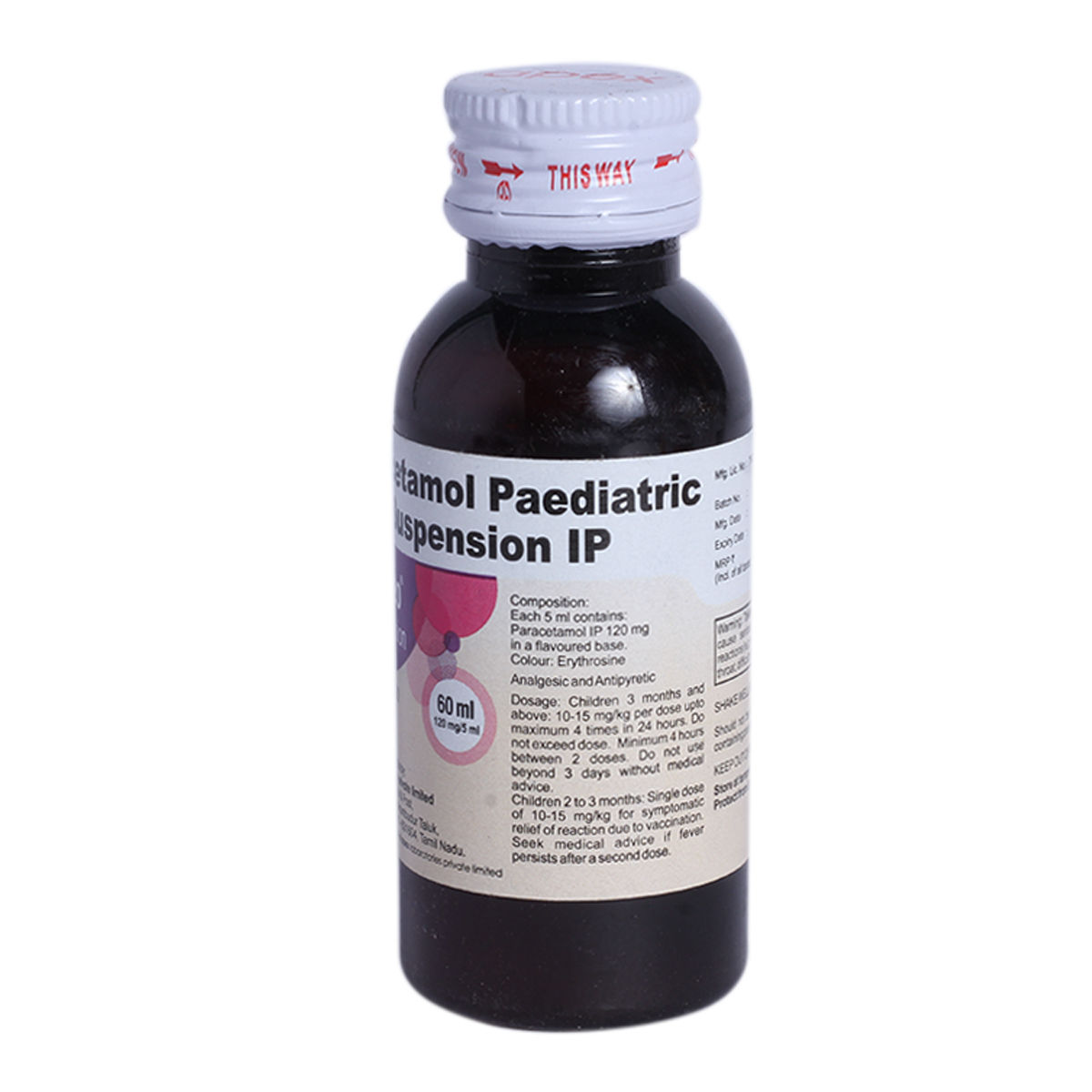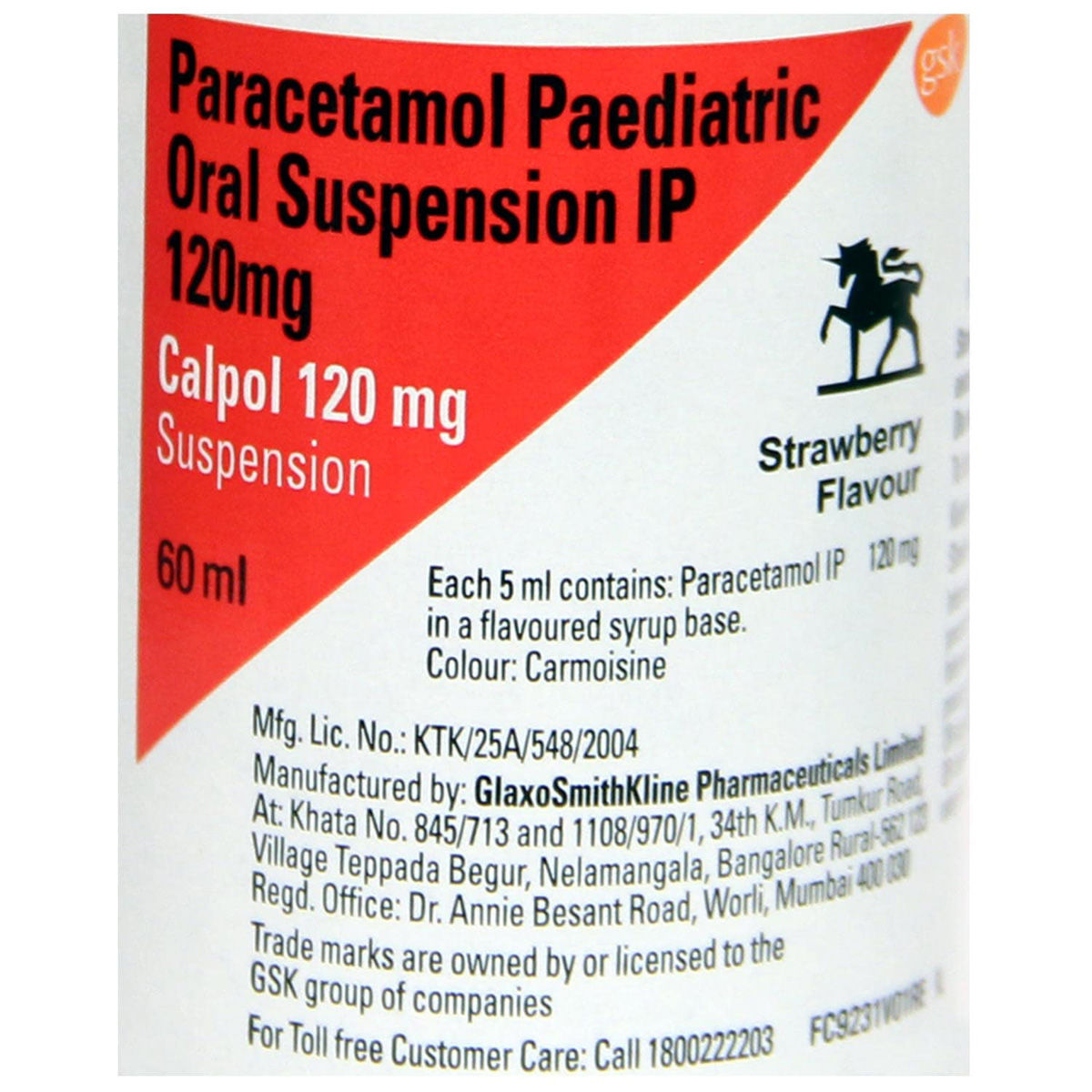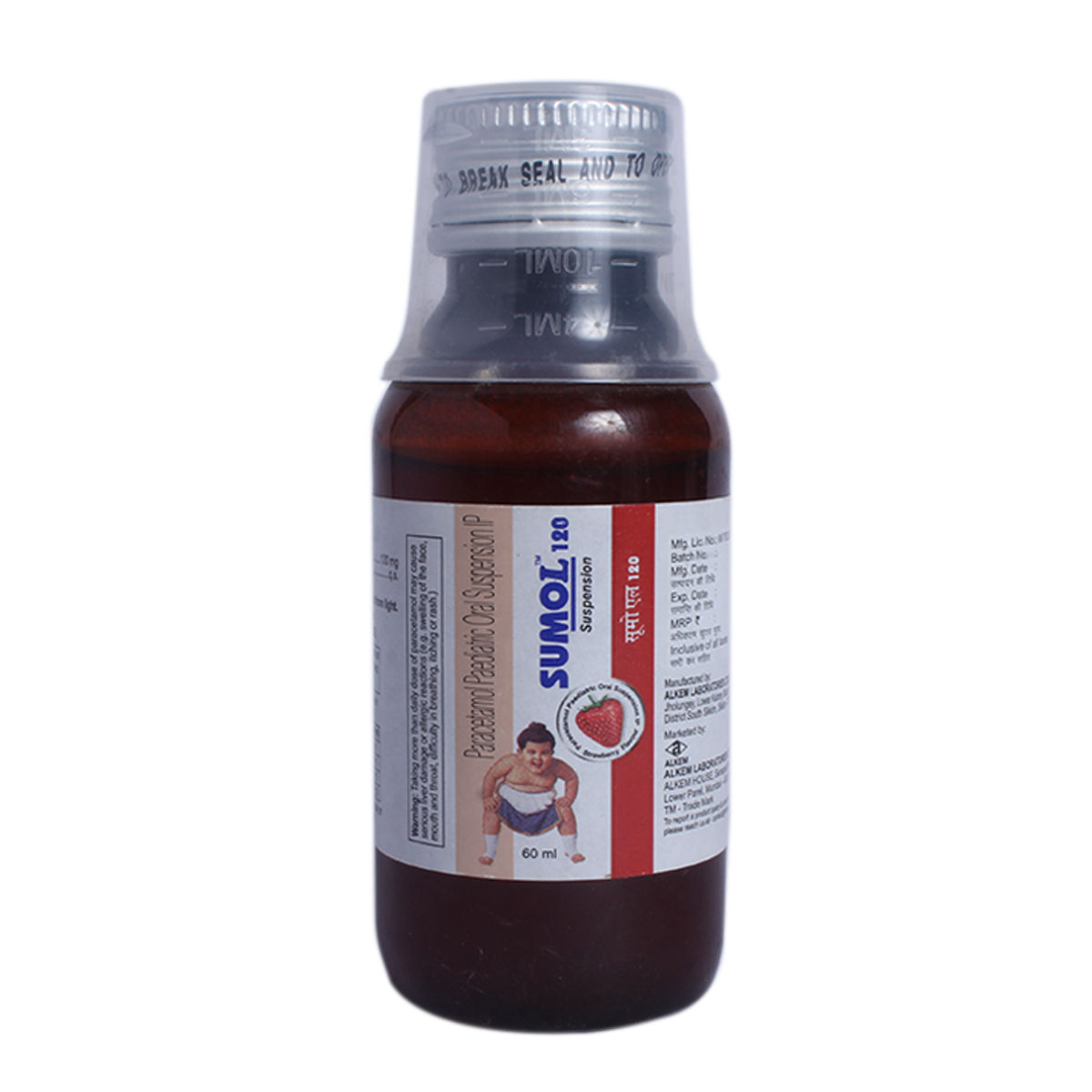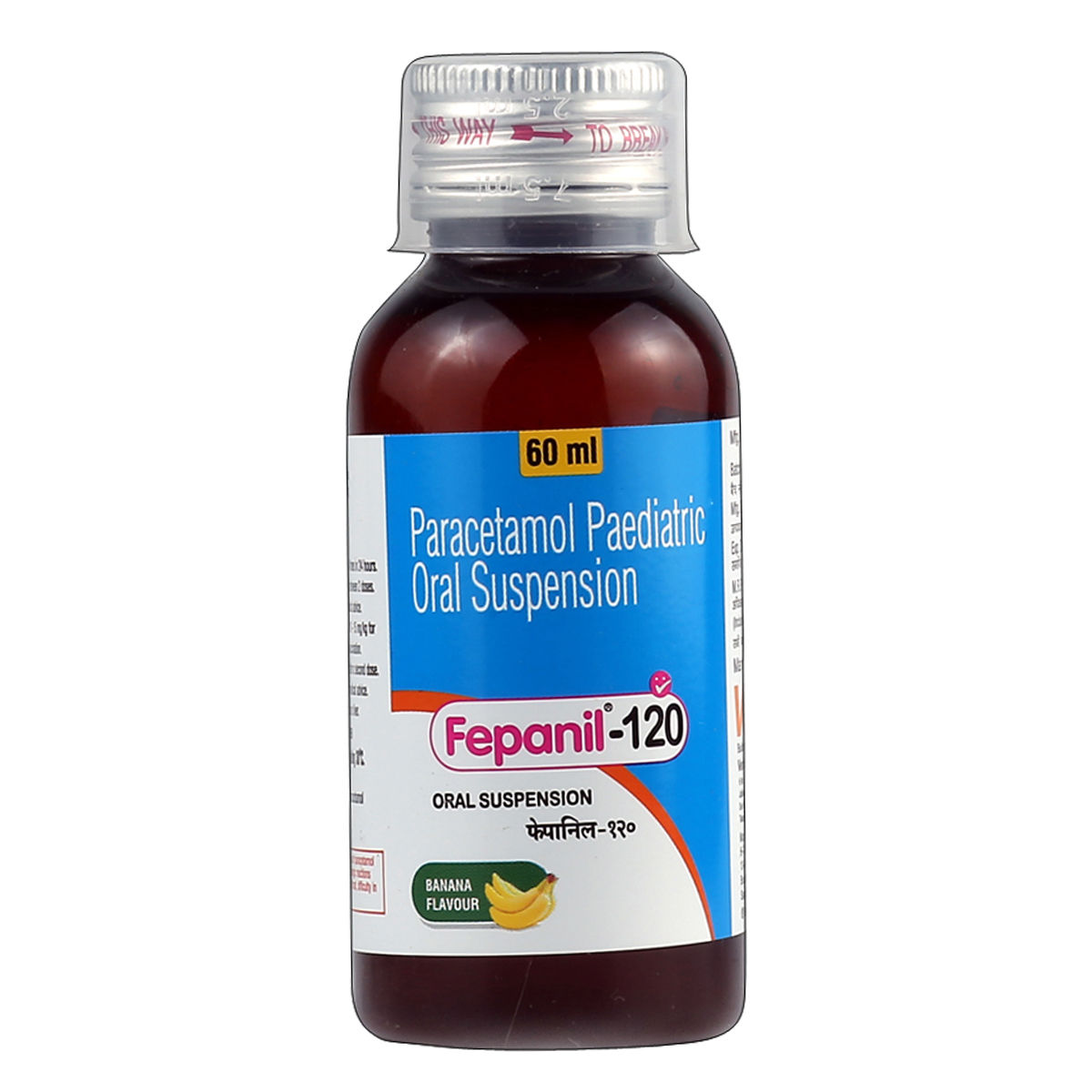P-120 Paediatric Suspension 60 ml




₹36.5*
MRP ₹40.5
10% off
₹34.42*
MRP ₹40.5
15% CB
₹6.08 cashback(15%)
Free Delivery
With Circle membership
(Inclusive of all Taxes)
This offer price is valid on orders above ₹800. Apply coupon PHARMA10/PHARMA18 (excluding restricted items)
P-120 Paediatric Suspension is used to reduce fever and treat mild to moderate pain. Also, it is used to relieve headaches, migraines, toothaches, period pain, back pain, muscle pain, and rheumatic pains. It contains Paracetamol, which works by inhibiting the production of certain chemical messengers in the brain known as prostaglandins. Thus, reduces pain. Also, it affects an area of the brain that regulates body temperature, known as the hypothalamic heat-regulating centre. Thereby, it reduces fever. In some cases, it may cause side effects such as nausea, stomach pain and dark-coloured urine.
Know Your Delivery Time
Provide Delivery Location

Secure Payment

India's Most Trusted Pharmacy

Genuine Products
Composition :
Manufacturer/Marketer :
Consume Type :
Return Policy :
Expires on or after :
NPPA :
About P-120 Paediatric Suspension
P-120 Paediatric Suspension belongs to the group of medicines called analgesics (pain killers) and antipyretics (fever-reducing agents) used to reduce fever and treat mild to moderate pain. It is also used to relieve headaches, migraine, toothache, period pain, back pain, muscle pain, and rheumatic pain. Pain and fever are caused by the activation of pain receptors due to the release of certain natural chemicals in the body, like prostaglandin.
P-120 Paediatric Suspension works by inhibiting the production of certain chemical messengers in the brain known as prostaglandins, reducing pain. Also, P-120 Paediatric Suspension affects an area of the brain that regulates body temperature, known as the hypothalamic heat-regulating centre, reducing fever.
Take P-120 Paediatric Suspension as advised by your physician. Your doctor will recommend how often you need to take P-120 Paediatric Suspension based on your medical condition. In some cases, P-120 Paediatric Suspension may cause side effects such as nausea, stomach pain and dark-coloured urine. Most of these side effects of P-120 Paediatric Suspension do not require medical attention and gradually resolve over time. However, if the side effects persist or worsen, please consult your doctor.
Avoid taking P-120 Paediatric Suspension if allergic to it. P-120 Paediatric Suspension is not recommended for children below 6 years of age. If you are pregnant or breastfeeding, please consult a physician before using P-120 Paediatric Suspension. Avoid alcohol consumption with P-120 Paediatric Suspension as it may increase the risk of liver damage. If you have an impaired nutritional state caused by anorexia (eating disorder), malnutrition or alcohol abuse or if you are dehydrated, inform your doctor before taking P-120 Paediatric Suspension.
Uses of P-120 Paediatric Suspension
•Pain Relief: P-120 Paediatric Suspension is commonly used to treat mild to moderate pain, including headaches, toothaches, muscle aches, and menstrual cramps. It works by suppressing the brain's production of prostaglandins, which induce pain.
•Fever Reduction: P-120 Paediatric Suspension effectively reduces fever caused by infections or other conditions. It lowers the body's temperature by working on the hypothalamic heat-regulating area.
•Cold and Flu Symptom Relief: P-120 Paediatric Suspension is also used to treat cold and flu symptoms such as body pains, fever, and headaches.
•Post-Surgery Pain Management: P-120 Paediatric Suspension is used to treat post-surgery pain, especially when it is mild to moderate, as an alternative to heavier pain drugs.
•Arthritis-related Pain: P-120 Paediatric Suspension is used to treat joint pain and discomfort caused by osteoarthritis and rheumatoid arthritis, reducing pain and inflammation.
Directions for Use
Swallow it as a whole with a glass of water. It can be taken with or without food anytime. Do not crush, break or chew it.
Medicinal Benefits
P-120 Paediatric Suspension contains Paracetamol, an analgesic (pain killer) and antipyretic (reduces fever). It inhibits the production of certain chemical messengers in the brain known as prostaglandins, reducing pain. Also, P-120 Paediatric Suspension affects an area of the brain that regulates body temperature known as the hypothalamic heat-regulating centre, reducing fever.
How P-120 Paediatric Suspension Works
Storage
 40 people bought
40 people bought - Inform Your Doctor: Notify your doctor immediately about your diarrhoea symptoms. This allows them to adjust your medication or provide guidance on managing side effects.
- Stay Hydrated: Drink plenty of fluids to replace lost water and electrolytes. Choose water, clear broth, and electrolyte-rich drinks. Avoid carbonated or caffeinated beverages to effectively rehydrate your body.
- Follow a Bland Diet: Eat easy-to-digest foods to help firm up your stool and settle your stomach. Try incorporating bananas, rice, applesauce, toast, plain crackers, and boiled vegetables into your diet.
- Avoid Trigger Foods: Steer clear of foods that can worsen diarrhoea, such as spicy, fatty, or greasy foods, high-fibre foods, and dairy products (especially if you're lactose intolerant).
- Practice Good Hygiene: Maintain good hygiene to prevent the spread of infection. To stay healthy, wash your hands frequently, clean and disinfect surfaces regularly, and avoid exchanging personal belongings with others.
- Take Anti-Diarrheal Medications: If your doctor advises, anti-diarrheal medications such as loperamide might help manage diarrhoea symptoms. Always follow your doctor's directions.
- Keep track of your diarrhoea symptoms. If they don't get better or worse or are accompanied by severe stomach pain, blood, or dehydration signs (like extreme thirst or dark urine), seek medical help.
- Get urgent medical help if you notice abnormal lung sounds with symptoms, like bluish skin, flare-ups of your nostrils, or trouble breathing.
- If you have asthma or allergies, managing these conditions with inhalers and bronchodilators can help prevent abnormal lung sounds.
- Infections may need antibiotics or breathing therapy to help open your airways and make breathing easier.
- Wash your hands regularly and take other steps to avoid getting sick and spreading germs.
- Doing breathing exercises can help improve your lung function and make breathing easier.
- Contact your physician right away if you suffer from hypoxia symptoms including chest pain, disorientation, or shortness of breath.
- Your doctor can monitor your progress and modify treatment programs with the help of routine follow-up sessions.
- Omega-3 supplements may support the transport of oxygen to tissues.
- Regular exercise improves cardiovascular health and boosts oxygen delivery to tissues.
- Quit smoking, as it can worsen hypoxia.
- Tell your doctor about the cough symptoms you're experiencing, which may be triggered by your medication.
- Your doctor may adjust your treatment plan by changing your medication, adding new medications, or providing guidance on managing your cough symptoms.
- Practice good hygiene, including frequent handwashing, avoiding close contact with others, and avoiding sharing utensils or personal items.
- Stay hydrated by drinking plenty of fluids, such as water, tea, or soup, to help thin out mucus and soothe your throat.
- Get plenty of rest and engage in stress-reducing activities to help your body recover. If your cough persists or worsens, consult your doctor for further guidance.
What if I have taken an overdose of P-120 Paediatric Suspension
Drug Warnings
Avoid taking P-120 Paediatric Suspension if allergic to it. P-120 Paediatric Suspension is not recommended for children below 6 years of age. If you are pregnant or breastfeeding, please consult a physician before using P-120 Paediatric Suspension. Avoid alcohol consumption with P-120 Paediatric Suspension as it may increase the risk of liver damage. If you have an impaired nutritional state caused by anorexia (eating disorder), wrong nutrition or alcohol abuse or if you are dehydrated, inform your doctor before taking P-120 Paediatric Suspension. Avoid taking more than recommended doses as it may increase the risk of serious liver damage.
Drug-Drug Interactions
Drug-Drug Interactions
Login/Sign Up
Co-administration of P-120 Paediatric Suspension 60 ml and Ketoconazole may increase the risk of liver injury.
How to manage the interaction:
Although there is a possible interaction between P-120 Paediatric Suspension 60 ml and Ketoconazole, you can take these medicines together if prescribed by a doctor. However, if you have joint pain or swelling, fever, chills, unusual bleeding or bruising, skin rash, itching, over-tiredness, nausea, vomiting, loss of appetite, stomach pain, dark-colored urine, light-colored stools, and/or yellowing of the skin or eyes, contact a doctor immediately as these may be signs and symptoms of liver damage. Do not discontinue the medication without consulting a doctor.
Co-administration of P-120 Paediatric Suspension 60 ml and Leflunomide may increase the risk of liver problems.
How to manage the interaction:
Although there is a possible interaction between P-120 Paediatric Suspension 60 ml and Leflunomide, they can be taken together if prescribed by a doctor. However, if you experience fever, chills, joint pain or swelling, unusual bleeding or bruising, skin rash, itching, less desire to eat, fatigue, nausea, vomiting, abdominal pain, or yellowing of the skin or eyes, contact a doctor immediately. Do not discontinue any medications without consulting a doctor.
Co-administration of Lomitapide and P-120 Paediatric Suspension 60 ml may increase the risk of severity of liver injury.
How to manage the interaction:
Although there is a possible interaction between P-120 Paediatric Suspension 60 ml and Lomitapide, you can take these medicines together if prescribed by a doctor. Do not stop using any medications without a doctor's advice.
Co-administration of Mipomersen with P-120 Paediatric Suspension 60 ml may increase the risk or severity of liver injury.
How to manage the interaction:
There may be a possibility of interaction between P-120 Paediatric Suspension 60 ml and Mipomersen, but it can be taken if prescribed by a doctor. Do not stop using any medications without talking to a doctor.
Co-administration of P-120 Paediatric Suspension 60 ml and Valdecoxib may increase the risk or severity of adverse effects.
How to manage the interaction:
Although there is a possible interaction between P-120 Paediatric Suspension 60 ml and Valdecoxib, you can take these medicines together if prescribed by a doctor. However, if the side effects worsen, please consult a doctor.
Co-administration of Teriflunomide with P-120 Paediatric Suspension 60 ml may increase the risk or severity of Liver problems.
How to manage the interaction:
Taking P-120 Paediatric Suspension 60 ml with Teriflunomide together can possibly result in an interaction, but it can be taken if a doctor has advised it. Do not discontinue any medications without consulting a doctor.
Co-administration of ketamine and P-120 Paediatric Suspension 60 ml may decrease the effectiveness of Ketamine which could result in a higher blood level.
How to manage the interaction:
Although taking Ketamine and P-120 Paediatric Suspension 60 ml together can evidently cause an interaction, it can be taken if a doctor has suggested it. If you're feeling very sleepy or having trouble breathing, it's important to contact your doctor right away. Do not stop using any medications without a doctor's advice.
Co-administration of P-120 Paediatric Suspension 60 ml may decrease the excretion rate of Oxazepam which could result in a higher serum level.
How to manage the interaction:
Although there is a possible interaction between Oxazepam and P-120 Paediatric Suspension 60 ml, you can take these medicines together if prescribed by a doctor. Do not stop using any medications without a doctor's advice.
Drug-Food Interactions
Drug-Food Interactions
Login/Sign Up
Diet & Lifestyle Advise
- Get adequate sleep, as resting the muscles can help in reducing inflammation and swelling.
- Follow heat or cold therapy, and regularly apply a cold or hot compress on the joints for 15-20 minutes.
- Acupuncture, massage and physical therapy may also be helpful.
- Eat foods rich in antioxidants such as berries, spinach, kidney beans, dark chocolate, etc.
- Foods containing flavonoids, such as soy, berries, broccoli, grapes, and green tea, help reduce inflammation.
- Maintain a healthy weight by performing regular low-strain exercises and eating healthy food.
- Avoid smoking and alcohol consumption.
Habit Forming
Therapeutic Class
P-120 Paediatric Suspension Substitute

Calpol 120 mg Suspension 60 ml
by Others
₹0.60per tabletDolo 120 mg Suspension 60 ml
by Others
₹0.61per tabletCrocin Suspension Strawberry Flavour 100 ml
by Others
₹0.61per tabletSumol 120 mg Strawberry Flavour Suspension 60 ml
by AYUR
₹0.61per tabletFepanil-120 mg Banana Suspension 60 ml
by Others
₹0.60per tablet
Product Substitutes
Alcohol
Unsafe
You are recommended to avoid consumption of alcohol with Paracetamol as it may cause severe liver damage.
Pregnancy
Caution
Please consult a physician if you are pregnant or planning for pregnancy before using this medicine. Your physician may suggest the lowest dose of Paracetamol for the shortest duration if you are pregnant.
Breast Feeding
Caution
Paracetamol may be excreted in small amounts in breast milk. Therefore, please consult a physician before using this medicine if you are breastfeeding.
Driving
Safe
P-120 Paediatric Suspension usually does not affect your ability to drive or operate machinery.
Liver
Caution
Take P-120 Paediatric Suspension with caution, especially if you have a history of liver diseases. Your physician may adjust the dose as required.
Kidney
Caution
Take P-120 Paediatric Suspension with caution, especially if you have a history of kidney diseases. Your physician may adjust the dose as needed.
Children
Consult your doctor
Please consult a doctor. Your doctor will prescribe a suitable dose of Paracetamol based on the age, body weight and condition of your child.

Have a query?
FAQs
P-120 Paediatric Suspension is used to provide relief from fever and mild-to-moderate pain.
P-120 Paediatric Suspension works by inhibiting the production of certain chemical messengers in the brain known as prostaglandins. Thus reducing pain. Also, P-120 Paediatric Suspension affects an area of the brain that regulates body temperature known as the hypothalamic heat-regulating centre. Thus, it reduces fever.
You are not recommended to take P-120 Paediatric Suspension with warfarin as co-administration of these two medicines may increase the risk of bleeding more easily. However, if you are supposed to use these medicines together, you are advised to contact your physician so that the dose may be adjusted appropriately and used safely.
P-120 Paediatric Suspension may affect how certain tests work, such as blood sugar tests and uric acid tests. Therefore, if you are about to undergo a blood test or any laboratory tests, inform your physician or lab technician that you are taking P-120 Paediatric Suspension.
You are not recommended to take P-120 Paediatric Suspension with other paracetamol-containing products as it may cause paracetamol overdose.
If you take more than the suggested dose of P-120 Paediatric Suspension, it may cause an overdose and lead to serious liver damage. The symptoms of overdose include vomiting, loss of appetite, stomach pain, paleness and nausea. However, if you have overdosed or experience any of these symptoms, please consult a doctor immediately.
P-120 Paediatric Suspension can be administered up to 4-6 times a day, ensuring a minimum gap of four hours between each dose. Avoid using P-120 Paediatric Suspension for more than three consecutive days without medical advice, as excessive use may harm the liver.
You can take P-120 Paediatric Suspension with or without a meal. However, if it causes stomach problems, it is best to take it after eating. Taking it with food may minimize the likelihood of nausea or discomfort in some people.
P-120 Paediatric Suspension is generally considered safe during pregnancy and breastfeeding when taken in the recommended amounts. However, it should only be used when necessary and with your doctor’s approval to avoid any risks.
You should consult your doctor before taking P-120 Paediatric Suspension with other medications. Some medications may interact with P-120 Paediatric Suspension, affecting its effectiveness or increasing the risk of side effects. Always check for possible interactions, especially if you are using other suggested or over-the-counter medications.
You should not use P-120 Paediatric Suspension for long-term pain management without consulting your doctor. While it is effective for short-term pain relief, using it for extended periods may raise the risk of side effects, especially liver damage.
No, P-120 Paediatric Suspension is not an antibiotic. It is usually used to treat pain and fever. Antibiotics are used to treat bacterial infections, while P-120 Paediatric Suspension does not have any effect on bacteria.
You can normally drive or ride a bike after taking P-120 Paediatric Suspension because it rarely causes drowsiness or impairs your ability to focus. However, if you feel dizzy, drowsy, or uncomfortable, you should avoid driving or riding until you feel better.
P-120 Paediatric Suspension is usually not recommended to be taken with alcohol. Alcohol can raise the chance of adverse effects, such as liver damage, particularly when combined with drugs like paracetamol. Consult your doctor for advice based on your health condition.
You can usually take P-120 Paediatric Suspension with an antibiotic. P-120 Paediatric Suspension helps with pain or fever, and the antibiotic treats the infection. Check with your doctor if you are taking any other medications or have any health problems.
Your doctor will prescribe the appropriate dose of P-120 Paediatric Suspension for your child based on their age, weight, and condition. Please consult a doctor for guidance.
P-120 Paediatric Suspension usually starts working within 30-60 minutes and can provide full relief within an hour. However, this might differ depending on your condition and how your body reacts.
You can take P-120 Paediatric Suspension and ibuprofen together for short-term pain relief if advised by the doctor, as they work differently. Make sure to take them at different times to avoid side effects. It's best to use this combination for a short period and ask your doctor if you're unsure or have other health conditions.
Yes, P-120 Paediatric Suspension can cause nausea and vomiting in some people, although these side effects are not very common. If you experience persistent nausea or vomiting, consult your doctor for advice.
P-120 Paediatric Suspension is not usually used to treat stomach pain from indigestion. It mainly helps with pain relief or reducing fever. Always consult a healthcare provider for the proper treatment.
Taking too much of P-120 Paediatric Suspension can be dangerous and may lead to serious side effects, especially liver damage. Common signs of overdose include nausea, vomiting, stomach pain, loss of appetite, yellowing of the skin or eyes, sweating, and extreme tiredness or confusion. If you take more than the recommended dose of P-120 Paediatric Suspension, get medical help immediately, even if no symptoms appear.
Country of origin
Manufacturer/Marketer address
Disclaimer
Author Details
We provide you with authentic, trustworthy and relevant information
Reference
- https://www.hpra.ie/img/uploaded/swedocuments/2b04cfdb-8571-4543-a4c9-b1380e0a92c3.pdf
- https://www.sahpra.org.za/wp-content/uploads/2020/06/Von-Paracetamol_PIL_Drugcompany_MCC-Format25-June-2001.pdf
- https://www.boots.com/wcsstore/ExtendedSitesCatalogAssetStore/Attachment/Product_PatientLeaflets/10186783%20Paracetamol%20PIL%2019%2009%202018.pdf
- https://www.drugs.com/paracetamol.html
- https://www.mims.com/india/drug/info/paracetamol?type=full&mtype=generic























